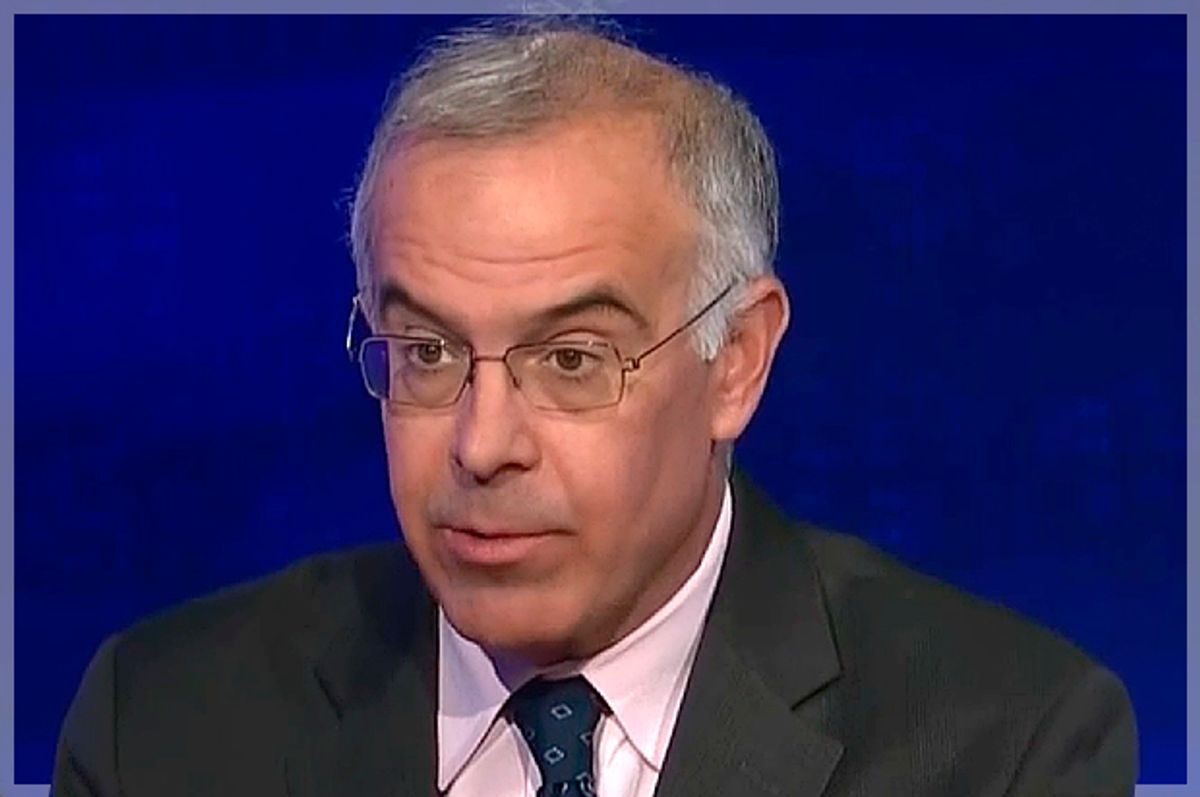I can’t believe I’m saying this, but David Brooks is making sense. In his New York Times column this morning, he appears to discover what at least half the country has long known: The Republican Party has been hijacked by unruly nihilists. “The House Republican caucus,” Brooks writes, “is close to ungovernable these days. How did that situation come about?” I’m not sure what prompted his eureka moment, but it’s nice to see Brooks, a card-carrying member of the conservative intelligentsia, finally reckon with the present state of the GOP.
Three months ago I wrote a similar column about the degeneration of conservatism and the Republican Party. I argued that conservatism, as a practical political philosophy, was essentially dead in this country. And that the GOP has abandoned its rich intellectual history, thinkers like Edmund Burke and Alexis de Tocqueville and even William F. Buckley, Jr. In today’s Republican Party, there is no place for ideas or compromise or prudent governance; it’s a party of reactionaries and insurgents, people drunk on destruction.
To his credit, Brooks grapples honestly with this in his piece. He writes:
This was not just the work of the Freedom Caucus or Ted Cruz or one month’s activity. The Republican Party’s capacity for effective self-governance degraded slowly, over the course of a long chain of rhetorical excesses, mental corruptions and philosophical betrayals. Basically, the party abandoned traditional conservatism for right-wing radicalism. Republicans came to see themselves as insurgents and revolutionaries, and every revolution tends toward anarchy and ends up devouring its own.
This is all undeniably true, but it didn’t happen in a vacuum. Today’s GOP is the inevitable result of decades of collusion between the Republican Party and the conservative media-industrial complex. The sane and reasonable conservative voices have been subsumed by the hysterical shrieks of Sean Hannity and Bill O’Reilly and the entrepreneurs on right-wing talk radio. These are the voices that represent conservative politics, and they are what’s poisoned the conservative brand. And Brooks makes no effort to deny this:
All of this has been overturned in dangerous parts of the Republican Party. Over the past 30 years, or at least since Rush Limbaugh came on the scene, the Republican rhetorical tone has grown ever more bombastic, hyperbolic and imbalanced. Public figures are prisoners of their own prose styles, and Republicans from Newt Gingrich through Ben Carson have become addicted to a crisis mentality. Civilization was always on the brink of collapse. Every setback, like the passage of Obamacare, became the ruination of the republic. Comparisons to Nazi Germany became a staple.
The lunatics on Fox News and on conservative radio are the ones peddling the crisis narratives and the apocalyptic angst, and over time this mentality has come to define the GOP. Brooks is absolutely right when he writes that “politics is the process of making decisions amid diverse opinions” and that it “involves conversation, calm deliberation, self-discipline, the capacity to listen to other points of view and balance valid but competing ideas and interests.” But balancing opposing points of view is impossible for a party of purists, and that’s exactly what the GOP has become, as Brooks himself acknowledges.
The collapse of the Republican Party has been a disaster for the country. Like it or not, ours is a two-party system that depends upon cooperation. But, as Brooks notes, “the new Republican officials did not believe in government and so did not respect its traditions, its disciplines and its craftsmanship.” Many Republicans appear not to believe in democracy itself. They deny the legitimacy of those who don’t share their views and they cynically work to obstruct rather than advance legislation. The consequences of this have been enormous, and it’s astonishing that a Democratic administration has been able to accomplish anything in the midst of such intransigence.
I’m not sure what took him so long, but it’s refreshing to see someone like Brooks write openly about the roots of Republican dysfunction. I don’t imagine his message will penetrate the conservative echo chamber anytime soon, but at least it’s a start.


Shares